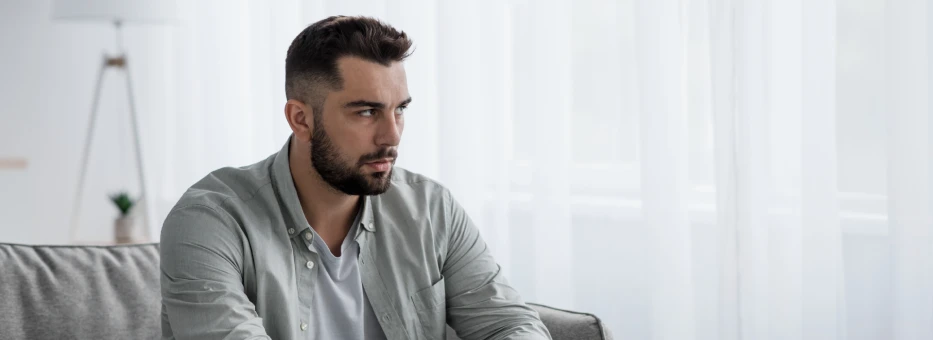Emotional withdrawal: When a man shuts down emotionally
Written by editorial staff writer at Hola. Medically reviewed by Amira Shah, MA in Counselling Psychology, Registered Psychotherapist. Originally published on 07 January 2025. Blog updated on 25 September, 2025.

Contents

Overview
Ever felt like you have lost a man, even when he is right beside you? Emotional withdrawal in a man impacts his mental health, personal connections, people around him, and overall quality of life for the entire family. Mental ill-health remains high among Australian men, with up to 25% experiencing a diagnosed mental health disorder in their lifetime, and 10% experiencing a disorder in 12 months. 1 Emotional shutdown is a term used to describe a person's distancing from their feelings, emotions, and relationships. In this article, we will examine the signs of emotional withdrawal in men, their underlying causes, and strategies for supporting them.Signs of a man withdrawing emotionally
- Reduced communication with partner, family, and friends.
- Increased anger, frustration, and irritability even with minor things.
- Reduced physical expression of emotions such as hugs, kisses, and holding hands.
- Prefer to be alone or overly engage in activities such as work, hobbies, or other things that do not involve loved ones.
- Not interested in discussing anything about emotions, such as feelings or relationship issues.
Communication changes
Emotional withdrawal in a man starts with reduced communication. A once-vibrant and happy person may seem less available to talk, answer, or start conversations.- Avoids discussing emotional matters: If your man is constantly saying "I don't want to talk about it", often avoiding conversation around feelings, relationship issues, he may be going through emotional withdrawal.
- Reduced communication: “A man who is emotionally withdrawn may prefer not talking to loved ones. Even when necessary, he may keep the answers brief or reduce them to a single word to ensure the conversation doesn't prolong” – stated Amira, a registered psychotherapist in Canberra.
- Deflects questions: When a man chooses to be alone or is going through an emotional withdrawal, he may avoid uncomfortable questions or refuse to answer any questions that make him uncomfortable. This includes questions about behaviour, relationships, what he is going through, and more.
Behavioural shifts
If your man prefers to be alone, avoids parties or intimacy, and seems distracted most of the time, this may indicate emotional withdrawal.- Prefers solitude: He may choose to spend time alone and distance himself from you, your family, and loved ones.
- Withdrawal from socialising: He may avoid most social interactions, joint plans, and outings with friends and family. Other habits, such as excessive screen time, late-night absences, and overworking, may also appear.
- Distracted during time together: Even when together, he may try to occupy himself with work or other activities to avoid communication or interaction. He might get angry or irritated if you try to initiate conversation or intimacy.
- Emotional Disconnect: If a man is emotionally disconnected, he may exhibit less empathy or affection towards you or his loved ones.
- Reduced empathy: He may seem to have little concern for your feelings or challenges, which can make you feel neglected or undervalued.
- Lack of affection: He may reduce displays of physical affection such as hugs, kisses, or cuddles.
- Not celebrating milestones: He may lose interest in celebrating birthdays, anniversaries, or other significant milestones.
Common causes of emotional withdrawal
Emotional shutdown in men can be sudden or develop due to psychological, emotional, or social factors. Relationship Factors: Ongoing disputes or unresolved issues within relationships can create an emotionally unsafe environment for men. Here are some relationship factors that might affect men to withdraw emotionally:- Ongoing conflict with you or a loved one
- Trust issues
- Feelings unappreciated
- Unmet emotional or physical needs
- Fear of hurting you
- Fear of being taken advantage of
- Depression
- Stress such as work stress, financial pressures, or relationship stress
- Anxiety about someone or a specific situation
- Post Traumatic Stress Disorder (PTSD)
- Personal loss or grief
- Job loss or extreme job pressure
- Chronic health issues or accidents
- Unable to balance life, burnout
- Societal expectations to shut down emotions
- Other possible factors include:
- Hormonal imbalances
- Substance abuse, such as alcohol or drug abuse
- Fear of losing control
- I'm unsure of how to express my feelings.
- Childhood trauma or childhood conditioning
Ready for positive change? Start your mental health care plan here.
Book an appointment
Fully bulk-billed, across Australia.
How emotional withdrawal affects relationships
When one person in a relationship, especially a man, withdraws and shuts down emotionally, it creates tension and misunderstanding. You may feel ignored, unloved, or rejected. This will put the relationship under strain, often contributing to feelings of loneliness for you and your family. According to Amira, “over time, it may erode trust and intimacy and, in some cases, lead to conflict, distance, or separation.”How to respond & support him
Supporting a man who is emotionally shut down requires patience, understanding, and a willingness to walk with him without judgment. Some cases can be improved with minor adjustments, while others require professional assistance.What you can do
You can start by understanding your partner or loved one and creating a safe space for them to express themselves. Here are some things you can do to support an emotionally withdrawn man:- Give him the space without judgment.
- Speak softly and avoid conflict or nagging.
- Encourage small steps and let him share little by little by asking open-ended questions.
- Suggest healthy habits that can help vent, such as exercise.
- Offer physical comfort, such as an occasional hug, if he allows it.
- Focus on building trust and helping him understand that you are there no matter what.
- Show empathy and celebrate even a small progress.
When to seek help:
Despite your efforts, if your partner is not showing improvement, it is advisable to consider seeking professional help. You should encourage your man to contact a doctor if:- You find signs of depression, such as continuous sadness or loss of interest.
- If he turns to substance abuse, such as alcohol or drugs.
- If this emotional withdrawal is continuing for weeks and months without any improvement.
- If he is expressing thoughts of self-harm or suicide.
- If his emotional withdrawal is doing irreparable damage to your family, your mental state, and if you are unable to cope on your own.
Getting doctor support
Once you have convinced your partner or loved one to seek professional help, the first step is typically to contact a primary care physician. Telehealth can be a convenient option for mental health support, especially for those who feel stigma about seeking care. Hola Health offers Medicare bulk-billed mental health care plans for eligible patients. These plans are created and approved by AHPRA-registered general practitioners who are trained in mental health assessments. A Mental Health Treatment Plan can include your personal goals and objectives, referrals to psychologists, online prescriptions for specific medications, and more. Forty-three percent of Australian men and boys will experience anxiety and depression at some stage in their lives. Whether you are dealing with anxiety, depression, grief, or loss, our compassionate general practitioners are always there to help. Speak to a registered practitioner for Mental Health Care Plans through telehealth consultation, 24 hours a day and 7 days a week, and completely free of charge if eligible for Medicare Bulk Billing. Emotional withdrawal in a man may provide short-term comfort, but over time, it can harm the psychological well-being of the man, the family, and personal connections. Identifying symptoms, learning to articulate emotions, and seeking help can help break this cycle.How Hola Health Can Help You
When someone begins to withdraw emotionally, it can feel isolating, confusing, and hard to navigate alone. Hola Health offers a supportive and confidential approach to addressing these challenges. Through 24/7 telehealth access, you can connect with registered doctors and mental health professionals from home — no long waits or offices needed. They can help you explore the causes behind emotional shutdown (stress, depression, trauma, relationship issues), suggest coping strategies, and guide you toward healing steps like therapeutic support, stress management, doctor medical certificate or referrals to specialists. Suppose you need a medical certificate, prescription, or just someone to listen and assess your mental health. In that case, Hola Health is there to provide timely, professional care — helping you feel seen and place you back on a path toward emotional connection and wellbeing. Running low on meds? Get an online script from home in minutes.
Request an instant script
Available 24/7, across Australia.
What we treat
- Cough
- Nausea & vomiting
- Fever
- Hayfever
- Fatigue
- Sore throat
- Acne
- Hair loss
- Gout
- Eczema
- Rosacea
- Sunburn
- UTI
- Erectile dysfunction
- Contraception
- Morning sickness
- Morning after pill
- Prostate health
- Anxiety
- Depression
- Stress
- Grief & loss
- Antidepressants
- Premature ejaculation
- Asthma
- Blood pressure
- Blood thinners
- Diabetes
- Cholesterol
- Migraines & headaches
- Allergies
- Body ache
- Heartburn & reflux
- Sleep disorder
- Pain relief
- Gastro
Related Articles
What Is Online Therapy? Everything You Need To Know About e-Therapy
February 19, 2026Mental Health
...
Disclaimer
This blog is for general informational purposes only and does not indicate that Hola Health provides all treatments or preventive measures mentioned. It is not intended to be a substitute for professional medical advice. Always seek the guidance of your doctor or other qualified health professional with any questions you may have regarding your health or a medical condition. For emergencies please immediately contact 000. Any medical topics discussed are intended to educate, not to imply availability through Hola Health.
 Facebook
Facebook  X
X  Copy Link
Copy Link



